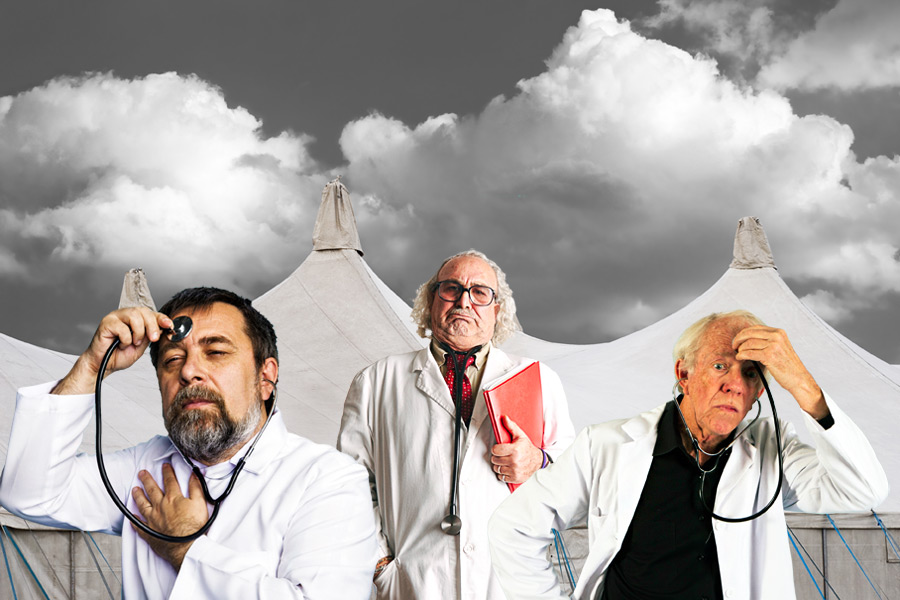Heimlich, Etc: No Big Shot Docs at Hamptons Events?

This is the time of year when dozens of fundraisers take place in the Hamptons. They are usually for medical nonprofits. They benefit labs that try to find a cure for cancer, heart disease, stroke or leukemia. Often the head of the laboratory is honored at the fundraiser. And sometimes a particular scientist working at the lab is a co-honoree. A really good fundraiser will also have a celebrity as emcee or an entertainer to perform.
What I’ve noticed, however, is that here in this big name resort, you never get the doctors to come out who have had the diseases named after them. I’ve never been to a fundraiser where the guest of honor was Alzheimer, or Parkinson or Addison, all of whom, very famous, have discovered the disease and have had it named after them by colleagues.
“Oh please, it was nothing.”
“Yes it was. And we are naming this disease for you.”
“Aw, shucks.”
One would think that here at this first-class resort we’d have the first-class discoverers. But apparently not.
I should imagine it would be very hard to be out in the world with a disease named after you. You discovered THAT? And what kind of legacy would he or she be leaving for the children? At school, they would be teased unmercifully.
On the other hand, we don’t have the doctors in attendance who have had good things named for them. I am thinking, for instance, of Heimlich, who saved millions of lives by inventing his maneuver to stop choking. There is Sabin, who has a vaccine named for him. And there is the guy who developed the Epley maneuver, this way of getting yourself better from an attack of vertigo. You lie down on your back with your head turned sideways, wait, then turn sideways the other way and roll over onto your left hip, no the other hip, not that hip, then, oh forget it. The only Epley I know is the mayor of Southampton. And he’s probably not the Epley who invented the Epley maneuver, but if he is, he should stand up and tell us because it is something to be proud of.
Back before people started naming diseases after themselves, or agreeing to allow others to name them after them, diseases and illnesses largely went by what they were called in Latin. There was bursitis, arthritis, hepatitis and so forth and so on. The term “itis” in Latin, I believe, translates to “disease of,” so bursitis means disease of the bursa, this cushiony thing that keeps bones from bumping into one another inside your body.
Doctors use lots of different Latin terms when they announce your diagnosis. I think it’s just to impress people when they don’t know what the hell it is. There’s also phlebitis and bronchitis. I do wonder about Stenosis, which is a deterioration you can get in your spine. Was there a Dr. Stenosis who discovered that? Or was it something else in Latin. And what about Anorexia? Or Dr. Pneumonia?
One time a few days after I came out from a long stay in a hospital, I got itchy bumps on my back and they told me it was Grover’s Disease, but it would be going away after a month, which it did.
We don’t even have a Dr. Grover at any of these fundraisers, or any other Muppet.
Someday, at the ultimate fundraiser in the Hamptons, I’d like to see all these good doctors get up front and wave to the crowd. From left to right, Dr. Heimlich, Dr. Epley, Dr. Sabin, maybe we could even get Dr. Koop and Dr. Salk if they are still around.
Out back, meanwhile, in the food preparers’ tent with all the cooks and dishwashers running around amidst the pots and pans, we could have a bridge game going.
“Three spades,” Dr. Parkinson says.
“Four clubs,” says Dr. Alzheimer.
Dr. Bell (from Bell’s Palsy) could be there, looking at the cards of the guy next to him, Dr. Addison. (JFK had Addison’s.) In folding chairs, Dr. Crohn and Dr. Grover sit silently. They will play the winners.



